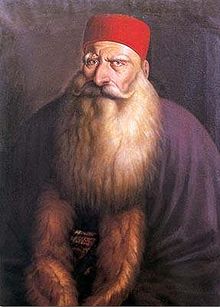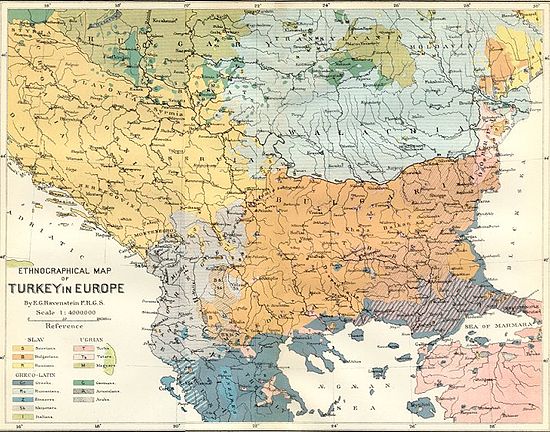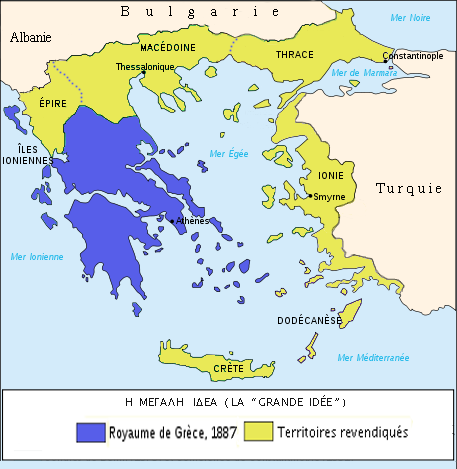Apologies for the lack of content recently but I have a relatively large part that should hopefully wet your appetite.
Chapter 38: The Syrian War
The Egyptian Army outside Acre
For Abdullah Pasha, the Wali of Sidon, the 14th of May was a normal day just like any other. Bandits operating from the ruins of Sanur continued to oppose the authorities and his attempts to combat them had been unsuccessful, blemishing Abdullah’s otherwise impressive Governorship. News from the capital was sporadic at best and what news he did receive from Constantinople proved to be depressing, particularly in the Balkans where the Albanian rebels defeated an Ottoman army near Tuzi capturing or killing nearly 1,000 men in early March. The efforts against the rebel Bosnians were similarly disappointing following an engagement near Stolac which ended in a stalemate of sorts. More worrying were the reports from Egypt of the grand aspirations of Muhammad Ali who looked to Syria with great desire and envy.
While it had started as a normal mundane day, it soon became anything but as a group of ships coming from the Southwest would soon change everything for Abdullah Pasha. Initial accounts indicated that 10 ships were approaching Acre from the South. This, however, quickly rose to 20 ships, then 30, and 50 all the way up to 128 ships. It was clearly too big to be the fleet of British, French, or Russian ships which still remained in the Aegean, nor could it be the Ottoman fleet which was still rebuilding after the disaster at Cesme. There was only one possible source for these ships, Egypt. Muhammad Ali had dispatched the greatest fleet the Muslim world had ever seen to conquer Syria, 76 warships with 5 ships of the line, 14 frigates, 29 Corvettes, 18 brigs with a whopping 3,600 guns between them. In addition, there were 10 fireships and 50 transport ships carrying 20,000 battle tested soldiers and the Scourge of Hellas himself, Ibrahim Pasha.
Landing his men to the South of the city, Ibrahim immediately offered terms to the Wali for his surrender, the surrender of the city, and the surrender of the Eyalet of Sidon. Should he accept, he would continue in his role as Governor with his allegiance shifting from Constantinople and the Sultan to Cairo and Muhammad Ali. Should he reject the terms for surrender, then Ibrahim would bombard the city into surrender with his fleet and slaughter all who resisted. While Abdullah Pasha had at one time considered Muhammad Ali his ally and friend, his loyalty lay with the Sultan and so his response was a definitive no as was expected. With little delay after Abdullah Pasha’s answer, Ibrahim commenced the siege of Acre in earnest at the crack of dawn on the 15th of May.
Before Ibrahim could complete his encirclement of Acre, however, Abdullah dispatched a contingent of riders to call upon his ally, the Emir of Mount Lebanon, Bashir Shibab.
[1] Though they had a tenuous relationship, Bashir had been a capable, powerful, and relatively loyal subordinate for Abdullah Pasha and had saved him once before in 1822 from the intrigues of Damascus. To his great surprise, Bashir and an army of Lebanese fighters had arrived far sooner than expected, arriving only four days later on the 18th. Rather than advance to his aid though, Bashir moved to take up positions alongside Ibrahim and his men. It immediately became clear to Abdullah that Bashir Shibab had thrown in with the Egyptians and provided them with support against him and the other Ottoman Agents in the region.
Bashir Shibab, the Emir of Mount Lebanon
With the betrayal of Bashir Shibab and the general unpreparedness of Acre for a long siege, Abdullah knew there was no chance for victory. While Acre boasted an impressive set of fortifications, Abdullah Pasha and much of the cities’ garrison had been caught off guard by the sudden arrival of Ibrahim and the Egyptian fleet. Most had believed the inevitable invasion by Muhammad Ali would take place further to the South against Jaffa or Ascalon, not Acre. As such, a large portion of the city’s guardsmen were still in Jabal Nablus chasing bandits and members of the Jarrar clan leaving the city egregious short on manpower. The size of the Egyptian fleet was also imposing as it deluged Acre with cannonballs. The display of military might by the Egyptians was so great that neighboring Haifa surrendered to Ibrahim without so much as a shot fired against it. After ten days of sweltering cannon fire Abdullah Pasha was forced to surrender the city to Ibrahim. For the former Wali of Sidon, his war was over as he was quickly shipped off to Egypt where he would remain locked away in a gilded cage, but for the Ottomans the war had only just begun.
While Ibrahim besieged Acre, another Egyptian army under Sulayman Bey had marched North along the coast with the utmost speed and efficiency conquering Gaza, Ascalon, and Jaffa before heading inland to capture Jerusalem on the 30th of May. After taking Jerusalem, Sulayman then turned towards Damascus in early June where he would spend the next six months sitting outside its walls in a prolonged siege. Unlike Abdullah Pasha, Mehmed Emin Rauf Pasha had received word of the Egyptian invasion, albeit only a week in advance of his counterpart in Acre. Still, this was enough time for the Wali of Damascus to gather his men and stockpile supplies when the Egyptians inevitably came for him. While Mehmed Pasha recognized he would likely be unable to defeat Sulayman Bey by himself, Sulayman had approximately 40,000 men, he could at least hold out until help arrived from Constantinople.
Ibrahim, after resupplying his forces and being reinforced with another 10,000 men, began moving North along the coast towards Tripoli on the 13th of June. Most cities in his path surrendered under the withering fire of the great Egyptian fleet, others submitted in anticipation of their arrival. In the span of six weeks, the entire Levantine coast from Gaza to Beirut had fallen forcibly or submitted peacefully to Muhammad Ali of Egypt. It would only continue from there as Ibrahim reached the port city of Tripoli on the 29th of June and immediately put in under siege.
For Sultan Mahmud and the Sublime Porte, the invasion of Ibrahim Pasha into Syria could not have come at a worse time. The rebellions of the Albanian Beys and the Bosnian Ayans had only just begun a few months before and the Ottomans had only just started pushing them back in the days preceding the invasion of Syria. With the Egyptian conquest of the Levant, progress on these fronts would likely slow as men and resources are pulled to the front in the East. Instead of killing the rebellion in the Balkans before it could metastasize, it was allowed to fester. One thing that was working in the Porte’s favor was the surprising support they received from the Serbians.
[2] Despite fighting a long and brutal war for independence over a decade before, they now fought alongside the Ottomans against the Albanians and Bosnians to protect their newly won autonomy and territory. Still, The Ottoman response to the invasion of Syria was slow at best.
Muhammad Ali’s demands had only arrived in Constantinople on the 12th of May at which time Ibrahim was already under way to Acre, which would itself fall long before any relief force could be dispatched by the Capital. While it took some time to prepare a new force to be sent East, by the end of June, an army 45,000 strong under the command of Osman Pasha was ready to challenge Ibrahim Pasha and the Egyptians. The newly refurbished Ottoman navy was also dispatched to challenge the Egyptian naval blockade of Tripoli. Arriving at noon on the 12th of July, the Ottomans and Egyptian ships engaged in a heated engagement. Despite being outnumbered 76 warships to 44, the Ottomans featured more ships of the line than the Egyptians at 7 to 5, and in frigates at 14 to 20. At the head of this fleet was the newly constructed First-Rate Ship of the Line,
Mahmudiye, which boasted 128 guns across three decks and over 1,200 crewmen, making it the largest ship in the world.
The Ottoman Flagship Mahmudiye
The Ottoman fleet managed to inflict some blows of their own against the Egyptians, sinking one of the Egyptian Ships of the Line, 3 frigates, a pair of corvettes, and a pair of brigs. In addition, another Third Rate, 3 frigates, and 7 corvettes were heavily damaged in the exchange with 19 more Egyptian ships suffering from minor damage to their hulls and sails. Sadly, these losses paled in comparison to the losses inflicted on the Ottoman navy, which lost 3 ships of the line, 7 frigates, and 4 sloops, along with 13 other ships taking heavy to light damage before it was forced to retreat at sunset. Even the Ottoman flagship, the mighty First Rate
Mahmudiye suffered terrible damage in the battle of Tripoli and would be forced to undergo extensive repairs at the Naval Arsenal for the remainder of the war.
The poor showing by the Ottomans off the coast of Tripoli was likely a result of the terrible condition the
Mahmudiye was in prior to the battle. Despite only being two years old, the
Mahmudiye was already suffering from extensive dry rotting in its hull making it much weaker than it should have been. As a result, it suffered extensive damage during the opening rounds of the battle and quickly began to take on water, forcing it to withdraw. The retreat of their flagship in the early stages of the battle deeply demoralized the remainder of the Ottoman Navy and disorganized the remainder of the fleet. Taking advantage of this opening, the smaller Egyptian ships quickly swarmed the slower Ottoman ships and inflicted a severe blow on their Turkish counterparts that they would not recover from anytime soon.
With Egyptian naval superiority maintained, Osman Pasha’s army was forced to travel overland and would only arrive in Northern Syria by mid-September at which point Tripoli had fallen and the Egyptians had advanced as far North as the outskirts of Alexandretta. Osman, rather than remaining on the defensive at Alexandretta, opted instead to march his weary men south through the Belen Pass to challenge Ibrahim directly. The Egyptians, however, where waiting for him, having arrayed themselves in the hills overlooking the pass, Ibrahim released a devastating volley of gunfire and cannon fire on the approaching Ottomans. Despite the valor and numerical superiority of the Turkish soldiers, they were forced to retreat, first to Adana and then to Icel and the Taurus mountains where they would remain throughout the winter guarding the passes into the Anatolian heartland of the empire.
When news of Osman Pasha’s defeat reached Damascus in late November, Mehmed Pasha surrendered the city to Sulayman Bey and the Egyptians. Though he had managed to hold out for nearly six months, his supplies where running dangerously low, the city was nearing starvation, and his men were on the verge of mutiny. Without any hope of reinforcement, their last reason for holding out had disappeared and so they surrendered. The fall of Damascus opened the Syrian interior to the Egyptians who now stood poised to take it in the falling campaign season. With Ibrahim and his men stationed in the North to oppose any further Ottoman advances and the Egyptian navy retaining dominance at sea, Syria was effectively lost to the Sublime Porte and by the start of 1832 they were likely to lose much more.
With the arrival of Spring, Ibrahim once more embarked on the offensive, targeting the Ottoman positions near Icel which fell in early April, followed soon after by Karaman two weeks later. Ibrahim did not have time to celebrate as an Ottoman army, 50,000 strong under the command of the Grand Vizier Khosref Pasha was fast approached the city from the Northwest with every intention of catching and crushing Ibrahim’s paltry force of 21,000. Despite being outnumbered over 2 to 1, Ibrahim stood his ground, erected his defenses as quickly as possible and readied his men for battle. Arranging his forces into four columns, three in the front and one in reserve.
Once the Ottoman soldiers came into range, Ibrahim’s artillery opened fire on the approaching Ottoman infantry in a ruthless barrage on cannon fire. Hundreds of men were struck down in a matter of seconds as iron and lead ripped through flesh and bones. Still, the Turkish soldiers continued their charge and soon met the Egyptian and Arab soldiers of Ibrahim’s army in hand to hand combat. Swords clashed against swords and bayonets against bayonets. The battle swung back and forth on the edge of a knife for several moments, but gradually the Ottomans were pushing the numerically inferior Egyptians back. However, by a stroke of good fortune, a gap appeared in the right flank of Khosref Pasha’s line.
Drawing up the last of his reserves, Ibrahim charged headlong into this gap. Through sheer determination and a bit of luck, Ibrahim succeeded in isolating the right column of the Turkish army as he fell upon it with all the might he could muster. In the ensuing chaos the Ottoman Right flank collapsed and retreated in a disorderly rout that soon spread to elements of the center column of the Turkish line. Now outflanked, Khosref Pasha ordered a withdrawal, ending the battle of Karaman. While Ibrahim held the field, his force had suffered terrible casualties in the engagement over 2,000 men were killed and another 5,300 were wounded. The Ottomans had suffered worse however, losing nearly 10,000 men to injury or death, and another 12,000 were captured or missing. It is at this point that Ibrahim received orders to stop from his father Muhammad Ali.
Fearing the imminent collapse of the Ottoman Empire, Britain and the Powers moved to intervene. The British Mediterranean fleet, which had been patrolling the Aegean since the end of the Greek War for Independence, was reassigned to the Eastern Mediterranean in a bid to persuade the Egyptians to back down from further conquests. On land, Russia and Austria signed treaties with the Ottoman government offering military assistance in the event Ibrahim advanced onto Constantinople. Prussia, despite lacking a border with the Ottoman Empire or the means to reach it, voiced its approval of intervention on its behalf. France, however, was conspicuously absent from the negotiations with the Ottoman Empire owing to their overt support of Muhammad Ali and Egypt. Rather than forcing the issue, Muhammad Ali accepted the Powers’ calls for peace in return for massive concessions from the Porte.
The Syrian Eyalet of Aleppo, Damascus, Sidon, and Tripoli were to be transferred to Muhammad Ali and his son Ibrahim. The Adana Eyalet was also ceded to the Khedive of Egypt cementing his place as the predominant magnate of the Ottoman Empire. While Egypt was still a part of the Empire in de-jure, it was for all intents and purposes an independent state after the Syrian war of 1831/1832. Muhammad Ali was free to conduct his own foreign policy, he set his own rates for taxes and tariffs, and he had unbridled control over his new territories. More than anything though, the war between Egypt and the Ottoman Empire had revealed how tenuous the hold over its territory was. It also revealed a break between Britain and France that had not existed since the Napoleonic wars and one that would only deepen with time.
Next Time: Three Glorious Days, Two Revolutions, and One Eaglet
[1] The Emirate of Mount Lebanon was a semi-autonomous emirate within the Ottoman Empire corresponding roughly with Northern Lebanon.
[2] They aren’t so much allies as they are co-belligerents. Serbia was given 6 traditionally Bosnian municipalities when it was officially established as a Principality in 1830, as such they are also a target of the Bosnian rebels who want this territory back.








